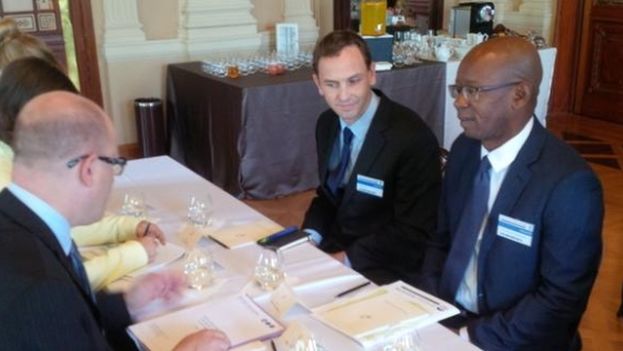
![]() 14ymedio, Havana, September — Czech Prime Minister Bohuslav Sobotka met Wednesday with Cuban dissident Manuel Cuesta Morua–leader of the Progressive Arc and promoter of several citizen projects–during the last day of the 19th version of Forum 2000 in Prague. In the conversation, the head of state was interested in the political and economic events in Cuba and especially the situation with regards to human rights.
14ymedio, Havana, September — Czech Prime Minister Bohuslav Sobotka met Wednesday with Cuban dissident Manuel Cuesta Morua–leader of the Progressive Arc and promoter of several citizen projects–during the last day of the 19th version of Forum 2000 in Prague. In the conversation, the head of state was interested in the political and economic events in Cuba and especially the situation with regards to human rights.
Sobotka, who delivered a speech during the last day of the forum on the promotion of democracy and education for development, welcomed the first signs of opening from the current regime on the island. The prime minister said that the Czech government was going to continue its long tradition of supporting the political liberalization and acceptance of human rights in Cuba.
Cuesta Morua is one of the five Cuban delegates who participated in Forum 2000, an annual event that started Sunday, bringing together activists and democrats from all over world. The initiative, founded in 1996 by president Vaclav Havel, the Japanese philanthropist Yoheim Sasakawa and the Nobel Peace Prize Winner Elie Weisel, promotes democratic values, respect for human rights, development of civil society and the strengthening of religious, cultural and ethnic tolerance.
One of the panels most interesting to the Cuban delegation was the debate on the perspectives with regards to relations between Cuba and the United States, according to the Baptist pastor Mario Feliz Lleonart. “We also had an excellent opportunity for exchanges with delegates from around the world and with personalities who now have more elements to evaluate the situation in our country,” added the fellow activist.
The main presentations of this panel were made by Cuesta Morua and another Cuban, the writer Francis Sanchez, with moderation by the Venezuelan Enrique ter Horst. Also participating in the discussion were Barbara Haig from the United States and Marin Palous, representing the European Union.
With regards to the process of normalization between Washington and Havana, pastor Lleonart recognized that more than the differences between the two Cuban panelists, “the idea prevailed that, at the end of the day, the fate of the island must be shaped by Cubans.”
At the close of the panel, Cuesta Morua said that “the triangle is definitely closing,” but that for this to happen, it is necessary that “the United States and the European Union send the same message.” In his opinion, “then it will be the Cuban Government that is isolated, not the people.”
